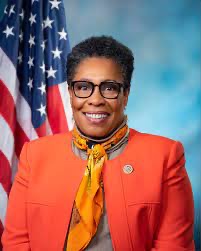Congresswoman Marcia Fudge was sworn-in Wednesday, March 10 as the nation’s new Secretary of the U.S. Department of Housing and Urban Development following a confirmation vote in the Senate the same day. She is the second Black female HUD Secretary in the Department’s history.
The final vote was 66-34. U.S. Senator Tammy Duckworth, who voted for Fudge, released the following statement after Fudge’s confirmation.
“Marcia Fudge’s commitment to advocating for American families will be invaluable as she works to tackle an economic and housing crisis caused by the COVID-19 pandemic. I believe that as Secretary she will prioritize access to affordable housing and investments in at-risk communities.
“I look forward to working closely with Secretary Fudge to address several housing challenges in our nation, including veteran homelessness, housing discrimination and housing accessibility for Americans with disabilities while supporting HUD’s vital public housing programs.”
Earlier Wednesday, the Senate confirmed former U.S. Supreme Court nominee and federal Judge Merrick Garland as the new U.S. Attorney General.
Garland was confirmed 70-30 by senators, with 20 Republicans joining all 50 Democrats in supporting him. He was expected to be sworn in at the Justice Department on Thursday, March 11.
For the first time in history, three Black women will serve in three key posts.
Cecilia Rouse, a renowned economist last month became the first Black woman to chair the nation’s Council of Economic Advisers (CEA). Former U.S. Senator Kamala Harris became the first female Vice President of America after she was sworn in last January.
Fudge, who represented parts of Cleveland and Akron in the House since 2008, is a former mayor and a longtime advocate for the poor. At her confirmation hearing in January, Fudge said her highest priority would be protecting the millions of Americans who have fallen behind on rent or mortgages due to a loss of income during the pandemic, telling senators that “we cannot afford to allow people in the midst of a pandemic to be put in the streets.”
Republicans opposed Fudge’s nomination after her public criticism toward the GOP. After Republicans moved immediately to fill the seat of U.S. Supreme Court Justice Ruth Ginsburg, Fudge called Senate Republicans “a disgrace to this nation” and said they “have no decency, they have no honor, they have no integrity.” Republicans responded by saying Fudge is out of touch with mainstream America,
But Democrats argued that Fudge’s experience was right for the times. Senate Banking, Housing and Urban Affairs Committee Chairman Sherrod Brown, an Ohio Democrat who lives in Fudge’s district, noted that parts of the area suffered a disproportionate number of foreclosures before the economic crisis a decade ago.
“She knows how for decades, communities have watched as factories closed, investment dried up, and storefronts were boarded over,” Brown said. “And she knows how many neighborhoods and towns have never had the investment they should — because of discrimination, because of redlining, because of decades of policy that funneled resources and jobs away from Black and brown communities.”
Senate Democratic Leader Chuck Schumer said Fudge “has a difficult job ahead of her” as millions of American renters are behind on payments and millions of homeowners are in forbearance.
“At the same time, we are on the verge of passing major assistance for renters and for homeowners,” Schumer said, just ahead of House passage of the $1.9 trillion COVID-19 relief bill. “As the incoming Secretary, I know Representative Fudge will implement that assistance with alacrity.”
The COVID-19 relief bill provides about $30 billion to help low-income households and the unemployed afford rent and utilities, and to assist the homeless with vouchers and other support. States and tribes would receive an additional $10 billion for homeowners who are struggling with mortgage payments because of the pandemic.
For Garland, the confirmation as the nation’s top prosecutor is consolation after Senate Republicans refused to confirm him as President Barack Obama’s U.S. Supreme Court nominee after the death of Antonin Scalia in 2016.
Garland now heads a department that was ravaged by political influence, instability and a revolving door of turnovers under President Donald Trump.
Garland, the former chief judge of the U.S. Court of Appeals for the D.C. Circuit has been praised by members of both parties. Last month, he pledged in his nomination hearing to “fend off any effort by anyone” to politically influence the Justice Department’s investigations, and that his first priority would be to fully prosecute the “heinous” crimes committed in the attack on the U.S. Capitol on January 6.
“America can breathe a sigh of relief that we are finally going to have someone like Merrick Garland leading the Justice Department,” said Senate Majority Leader Chuck Schumer, a Democrat from New York. He called Garland “someone with integrity, independence, respect for the rule of law and credibility on both sides of the aisle.”






